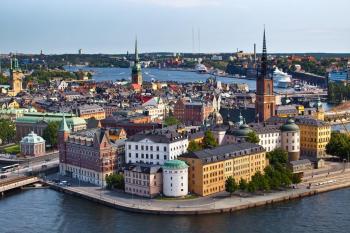find your perfect postgrad program
Search our Database of 30,000 Courses
Postgraduate Study in Sweden
Find courses in SWEDENSweden is the third largest country in Western Europe covering an area of 450,000 km². It shares borders with Norway and Finland, and is connected to Denmark via a bridge-tunnel.
Sweden experiences extremes of climate throughout the year with very cold and dark winters and bright, sunny summers. This is due to its proximity to the Arctic Circle, and in fact the northern tip of Sweden actually lies above the Arctic Circle!
Sweden boasts some really stunning scenery which it is determined to keep – in fact it values this attribute so much that it is the first European country to protect its most vulnerable natural heritage. Over half of the country is covered by forest – and there are also many lakes and rivers – covering around 10% of the country.
The capital city of Sweden is Stockholm, and this is an attractive, modern and cosmopolitan city which is built on 14 different islands. It is also the most populated city in Sweden with almost a quarter of the population choosing to reside here.
Overall Sweden has a population of around nine and a half million people and there are around 430,000 students of which around 10% are international students. The vast majority of Swedes speak English fluently and many Swedish companies use English as their official working language – which is a great advantage to international students.

Sweden is a member of the European Union (EU) and the Organisation for Economic Co-operation and Development (OECD). The currency in Sweden is the Swedish Krona (SEK).
Swedish universities & education
The first Swedish university was founded in the 15th century. Nowadays Swedish universities are renowned throughout the world for their investigative research and independent thinking. There are around 600 English-language degree programs on offer at Swedish universities.
The Swedish Riksdag (parliament) and government have overall responsibility for higher education and research, meaning they allocate resources and make all the important decisions via the Ministry of Education and Research. However the universities and colleges do make their own decisions about course content, admissions policies, grades, etc.
In 2007 Sweden introduced a new structure for education and degrees with three levels, bachelor, master and research(PhD) to fall in line with the rest of Europe. Each level requires that students have a degree from the preceding level of study – this is compatible with the European Credit Transfer System (ECTS).
In the last five years the number of applicants for full-time higher education programs in Sweden has increased by almost 85,000.
Masters programs
There are two different types of master degree programs in Sweden. The two year Degree of Master or masterexamen (120 ECTS) and the one-year Degree of Master or magisterexamen (60 ECTS). At Swedish universities it is very common for the masters degree programs to work closely with the industry, which gives students the chance to mix study and practical work – which can be very beneficial when it comes to finding employment at the end of the program.
PhD courses
There are around 18,000 research students currently enrolled in Sweden and about 20% of these have a non-Swedish background. PhD students are often fully funded by a research salary from their university. They can also apply for grants and scholarships for international research trips or any additional funding that they might require.
To be admitted to a postgraduate research position, a student must hold a university degree equivalent to a bachelor’s degree or higher, with a major in the same subject as the intended field of study. In most cases a master’s degree is required. Foreign students wishing to study for a PhD in Sweden are advised to prepare with a master’s degree in Sweden first, if a relevant program is available in English. A Swedish masters degree will improve a student’s chances of being accepted on a PhD program.
Sweden: tuition fees & funding
 Up until very recently Sweden’s higher education system was funded entirely by tax revenue, and everyone was exempt from tuition fees no matter what their nationality. However in 2011 tuition fees were introduced for all students from outside the EU/EEA and Switzerland. But the Swedish Government has allocated resources for two new scholarship programs designed to cover both living costs and tuition fees to help those foreign students who can’t afford to pay tuition fees.
Up until very recently Sweden’s higher education system was funded entirely by tax revenue, and everyone was exempt from tuition fees no matter what their nationality. However in 2011 tuition fees were introduced for all students from outside the EU/EEA and Switzerland. But the Swedish Government has allocated resources for two new scholarship programs designed to cover both living costs and tuition fees to help those foreign students who can’t afford to pay tuition fees.
The tuition fees only apply to bachelor’s and master’s programs and courses – PhD programs are tuition-fee free. Universities set their own fees, and these vary between SEK 80,000–140,000 (€9,000– €15,500) per academic year for most subjects, however medical and art programs do have considerably higher fees.
International students will also have to pay an application fee of SEK 900 (€100).
Scholarships
The Swedish Institute - which is a government agency - organises over 500 scholarships each year for students and researchers coming to a Swedish university.
Sweden: student living in Sweden
Sweden is an open, multicultural society, and with tens of thousands of international students opting to live and study here at any one time it provides a vibrant and international study environment. It is a thoroughly modern country which offers a very high standard of living and is known for its tolerance and equality. Many highly successful international companies originate from Sweden, which means it also has some great potential for post study career options.
Living costs
The cost of living in Sweden is relatively high with costs of alcohol and meals out exceeding those of many other European countries. Your living expenses (ie rent, bills, travel, etc) will probably be around SEK 7,300 (€820) per month.
Leisure time
Sport and outdoor pursuits are very popular in Sweden, and form a large part of the students’ lives. It’s a great idea to get involved in this via your university’s student union as it is a good way to meet people and make new friends. When you join your student union you will receive a student card that will entitle you to certain benefits including discounts on domestic travel. Many shops in Sweden also offer student discounts on presentation of this card.
In the brighter, lighter summer months there are many great outdoor activities to do in Sweden, including music festivals and outdoor theatres.
Work
Students enrolled at a Swedish university or university college can work in Sweden during the course of their degree program without a work permit, however a residence permit is necessary for those staying in the country longer than three months.
If you receive a job offer after finishing your studies, you can stay on in Sweden to work. As there are many international companies based in Sweden that use English as their corporate language there are plenty of opportunities are available for well-qualified non-Swedish speakers.
Healthcare & insurance
You must make sure you are covered by medical insurance for the duration of your stay in Sweden. If you are a fee-paying student your university may provide you with free insurance during your enrolment in their study program – so check with them before setting up anything on your own.
If your degree program is longer than one year, you are entitled to the same health benefits as Swedish nationals.
Sweden: visas & immigration
 Nordic citizen
Nordic citizen
Students from Nordic countries – Denmark, Norway, Finland, Iceland and Sweden – do not need a visa or residence permit to study in Sweden.
EU/EEA or Swiss citizen (non-Nordic)
If you are a citizen of a EU/EEA country or Switzerland (but non-Nordic) you have the right to reside in Sweden, which means that as an EU/EEA citizen you are permitted to stay in Sweden for more than three months without a residence permit. But to comply with immigration rules correctly you must register with the Migration Board within three months of entering Sweden.
To register with the Migration Board you will need:
1. Proof of enrolment for a study program.
2. Proof that you have sufficient funds for living.
3. Medical insurance valid in Sweden.
International students
If you are from a non-EU/EEA country and are intending to stay in Sweden for less than three months, you will probably still need a visa – it is a good idea to confirm exact visa requirements with your local Swedish consulate. If your degree program means you will be studying in Sweden for longer than three months, you will need a residence permit before arriving in Sweden.
Residence permits are issued by the Swedish Migration Board, and the applications are to be made at a Swedish consulate or embassy. You can’t apply for a residence permit unless you have been admitted to full-time accredited university studies in Sweden.
To apply for a residence permit you will need:
1. Proof that you have paid the first instalment of tuition fees.
2. Residence permit application fee of SEK 1,000 (€112) which is non refundable.
3. Proof that you have a guaranteed sum of money throughout the entire period of your studies. The Swedish Migration Board has set this amount at SEK 7,300 (€820) per month. And if you want to bring your family you must also prove that you have an additional SEK 3,500 (€390) per month for your spouse and SEK 2,100 (€235) per child per month. These amounts could be reduced if you can prove that you will be getting free lodging or substantially reduced lodging for the duration of your stay in Sweden. You should also bring proof of any scholarships you have been awarded as this may affect the amount of the guaranteed sum.
4. To have paid the first instalment of your tuition fees.
5. A valid passport.
6. A letter of admission from your institution
7. Medical insurance.
You should submit your application for a residence permit 6-8 weeks prior to your departure for Sweden.
Residence permits are limited to the duration of the study period, or to one year, whichever is shorter. Your permit will be renewed annually, provided you receive the number of credit points required and can produce evidence of continued financial support.
PLEASE NOTE: As a result of Brexit, from Autumn 2021 postgraduate students from the European Union studying at a UK university will be charged the same tuition fees as international students. Meanwhile, UK students studying their postgraduate course at a European university are also likely to incur higher tuition fees than their EU counterparts. It is advisable to check with the individual universities in the UK and Europe for up-to-date information on tuition fees for all postgraduate programs.
Find your PERFECT POSTGRAD PROGRAM
